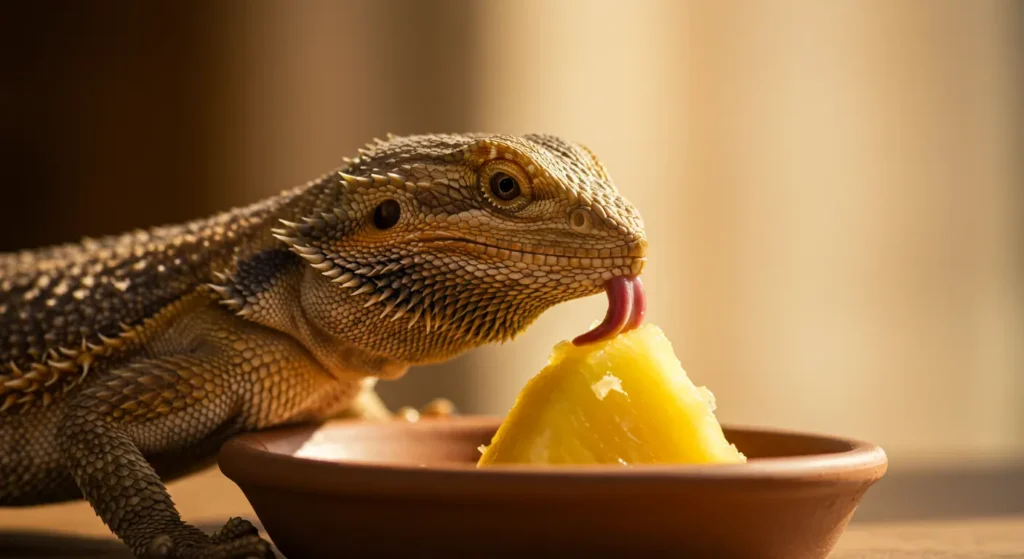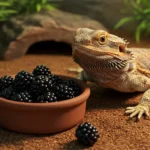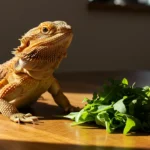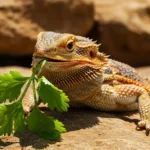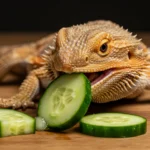Let’s get real—pineapple’s juicy, sweet, and instantly reminds you of a tropical getaway. But when your bearded dragon looks at that bright fruit with suspicion, you start to ask yourself: Can bearded dragons have pineapple safely? And what about pineapple juice—is it okay or completely off-limits?
In this article, we’ll answer the question Can bearded dragons have pineapple with clear, straightforward information. No confusing science or unnecessary fluff—just everything you need to know to make smart, safe choices for your pet’s diet. Whether you’re curious about how often to offer pineapple or concerned about potential risks, you’ll get the facts you need to keep your beardie healthy and happy, and maybe even enjoy a little tropical treat now and then.
Can Bearded Dragons Have Pineapple? Here’s What You Need to Know
Turns out… yes, they actually can eat pineapple. But—and this is a big but—it’s all about how much, how often, and how it’s served.
It’s not an everyday thing
It’s more like a once-in-a-while treat. Like that dessert you save for a weekend. Your bearded dragon’s gut isn’t built to handle too much sweetness or acidity, even if that little tongue seems to say otherwise.
So yeah, pineapple’s on the menu—but it’s gotta be the right way.
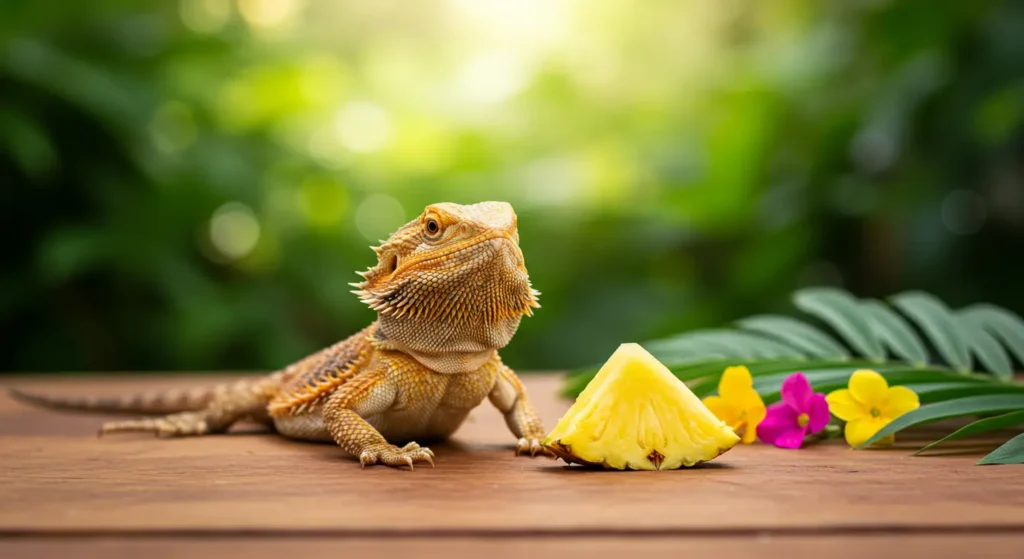
Is Pineapple Safe for Bearded Dragons in Small Amounts?
Can bearded dragons have pineapple safely if it’s just a small bite? Yes—fresh pineapple is safe for bearded dragons when offered in tiny amounts. It contains vitamin C, some antioxidants, and a little hydration, which can be beneficial as an occasional treat.
However, pineapple is also very acidic and high in natural sugar. While your bearded dragon might enjoy the sweet flavor, too much of it can irritate their digestive tract and even lead to health issues like loose stools or long-term calcium imbalance. That’s why moderation isn’t just a suggestion—it’s a rule.
Only give your dragon a small, fresh piece once every few weeks. Avoid giving it too often, and never serve large chunks. Always remove the core and spiky skin, which are hard to digest and can be dangerous.
And skip canned pineapple altogether. It’s usually soaked in syrup and loaded with added sugars and preservatives, making it completely unsafe for reptiles.
So yes, pineapple is safe for bearded dragons—but only when it’s fresh, plain, and kept to a strict “treat only” schedule.
The Role of Sugar and Acidity in Reptile Diets
Can bearded dragons have pineapple, even though it’s full of sugar and acid? The answer depends entirely on portion control. While fresh pineapple offers a small nutritional boost, its sugar and acid levels can be dangerous if overfed.
Bearded dragons are not built to handle frequent sugary foods. Too much sugar can disrupt their gut flora, leading to imbalances, bloating, or even fatty liver disease—a serious issue in reptiles. Weight gain and poor energy levels are also common symptoms when sweet fruits are given too often.
Acidity is another problem. Excess acid can irritate your dragon’s digestive lining, causing discomfort, diarrhea, and long-term inflammation. It’s like giving hot salsa to a toddler—bad idea.
That’s why fruits like pineapple should only be served occasionally, in small amounts. When in doubt, stick to leafy greens and gut-loaded insects.
Moderation is key—because even “healthy” fruits can be harmful when given too freely.
How Pineapple Affects a Bearded Dragon’s Digestive Syste
You might be wondering: can bearded dragons have pineapple without upsetting their digestive system? In most cases, yes—but only in very small portions. Their digestive system is designed for insects, greens, and select fruits, so throwing in something acidic like pineapple needs caution.
A bit of pineapple once in a while won’t do harm, but regular servings can cause trouble. Bearded dragons may react to the acidity and sugar with runny stools, lethargy, or even a loss of appetite.
These signs mean their gut is stressed. If you notice any of these symptoms after feeding pineapple, stop immediately and go back to their usual safe foods—like collard greens, squash, or dubia roaches.
Even though their digestive system is strong, it’s not invincible. Pineapple should be treated as a rare luxury, not a diet staple. Serve it wisely to keep your beardie’s digestion smooth and stress-free.
Nutritional Breakdown of Pineapple: Helpful or Harmful?
Let’s talk about what’s actually inside that juicy slice. Is it just sugar, or does it bring something useful to the beardie table?
Key Nutrients in Pineapple: Vitamin C, Manganese & More
Can bearded dragons have pineapple for its nutrients? Surprisingly, yes—pineapple isn’t all sugar and acid. It contains a few helpful compounds that can benefit your beardie in very small doses.
Fresh pineapple offers vitamin C, which plays a key role in immune system support. It also contains manganese, a mineral that helps with bone structure and overall metabolic function. Another standout compound is bromelain—a natural enzyme that aids digestion. However, too much bromelain can irritate your dragon’s stomach lining, so moderation is essential.
So, while pineapple does have some health benefits, those positives don’t outweigh the risks of overfeeding. You can offer it as an occasional treat, but not as a nutritional staple.
To play it safe, always serve tiny pieces of raw pineapple and space them out by several weeks. That way, your bearded dragon can enjoy the flavor without compromising their health.
Calcium to Phosphorus Ratio and Why It Matters
One of the most important questions to ask is this: can bearded dragons have pineapple without disrupting their calcium-phosphorus ratio? Unfortunately, the answer leans toward caution.
Bearded dragons require a calcium-rich diet to maintain strong bones and prevent metabolic bone disease (MBD). Pineapple, however, has more phosphorus than calcium, which is a red flag for long-term health.
Phosphorus binds to calcium in the body, making it harder for reptiles to absorb what they need. When this happens regularly, it can lead to weak bones, deformities, and irreversible damage.
That’s why fruits like pineapple should never make up a large part of a dragon’s diet. Leafy greens like collards or mustard greens are far better calcium sources. So, while the occasional bite of pineapple is okay, it should never replace more nutritious staples.
Stick to low-phosphorus veggies and dusted insects for daily feeding—and treat pineapple like dessert.
Oxalates and Acidity: Are They Dangerous for Beardies?
Some owners wonder: can bearded dragons have pineapple despite oxalates and acidity? The short answer is—yes, but it comes with risk. Pineapple contains moderate levels of oxalates, which can block calcium absorption in the body. Combined with the fruit’s naturally high acidity, this can create digestive stress and reduce nutrient uptake.
Although pineapple isn’t as oxalate-heavy as spinach or beet greens, the risk is still worth noting. Too many oxalates in the diet can contribute to calcium deficiency over time—especially when paired with acidic foods or fruits that are low in calcium.
To keep your beardie safe, always serve fresh, raw pineapple in very small pieces. Avoid pineapple juice altogether. Juice is concentrated in sugar and acidity, and it lacks the fiber your dragon needs to slow down digestion.
When it comes to oxalates and acidity, less is more. A little pineapple goes a long way—anything beyond that can throw your dragon’s system off balance.
Can Bearded Dragons Have Pineapple Juice?
Can bearded dragons have pineapple juice? The answer is a firm no. Even if it’s labeled as “natural,” “100% juice,” or “fresh-squeezed,” pineapple juice is far too concentrated for your bearded dragon’s system.
Unlike whole pineapple, which has fiber to help slow digestion, juice strips all of that away. What’s left is pure sugar, intense acidity, and none of the protective benefits. Giving juice—even just a small sip—can spike your dragon’s blood sugar, irritate their digestive lining, and upset their calcium balance.
Some owners consider adding a drop to water or using it as a treat, but that’s a risky move. It might seem harmless, but reptiles aren’t built to handle liquid sugars and acids the way humans are.
If you want to treat your dragon, stick to tiny pieces of raw, fresh pineapple, spaced weeks apart. Juice is for humans—not beardies.
Keeping their diet fiber-rich, low in sugar, and balanced in calcium is the best way to support long-term health.
How Often Can Bearded Dragons Eat Pineapple?
Moderation isn’t just a buzzword here—it’s the whole strategy.
Occasional Treat vs. Regular Snack—What’s the Rule?
So, can bearded dragons have pineapple as a regular snack? Not really. Pineapple should always be considered an occasional treat, not a frequent part of their routine. Due to its high sugar and acid content, feeding it too often can harm their digestion and long-term health.
A good rule to follow is once every three to four weeks—no more. This timing gives your dragon enough space between servings to avoid issues like diarrhea, calcium imbalance, or stomach irritation. It also makes the treat feel special and exciting, rather than something they expect every week.
To keep your bearded dragon interested in their diet, rotate pineapple with other safe fruits like blueberries, papaya, or watermelon (in small amounts). This variety helps avoid overloading them with the same fruit and keeps their nutrient intake balanced.
So yes, bearded dragons can have pineapple, but only as a monthly treat, not a regular snack. Moderation is what keeps them happy and healthy.
Age Matters: Can Baby or Juvenile Dragons Eat Pineapple?
A common question is: can bearded dragons have pineapple when they’re young? For baby or juvenile beardies, the answer is no. Their dietary needs are very different from adults.
Young dragons need a high-protein, low-sugar diet to support rapid growth and strong bone development. Feeding sugary fruits like pineapple during this critical stage can disrupt their nutritional balance and lead to serious health problems.
Too much sugar can interfere with calcium absorption, affect their energy levels, and cause digestive stress. What they need instead are gut-loaded insects, calcium-rich greens, and a carefully managed supplement plan—not acidic fruits.
Once your dragon is fully grown, you can consider introducing small amounts of pineapple, but not before that. Until then, keep their diet focused on growth, not treats.
So while adult bearded dragons can have pineapple occasionally, babies should avoid it completely.
Portion Control and Serving Sizes That Are Safe
Even though can bearded dragons have pineapple is a “yes,” it still comes with a big caution: portion size is everything.
A good rule is to serve no more than one small piece, about the size of the space between your dragon’s eyes. This keeps the portion manageable and prevents your beardie from consuming too much sugar or acid at once.
Only offer pineapple once a month at most, and always choose fresh, raw fruit. Never use canned pineapple or juice—it’s loaded with preservatives and extra sugar.
If you’re adding pineapple to a fruit and veggie salad, make sure it’s the smallest portion on the plate. Leafy greens and calcium-rich veggies should take up the majority of the meal, with pineapple acting as a minor accent.
So yes, can bearded dragons have pineapple? They can—but only in small, carefully measured servings to protect their health.ggies.
Safe Feeding Practices: Preparing Pineapple for Your Bearded Dragon
You’ve got the green light to feed pineapple, but proper preparation is key to keeping your bearded dragon safe and healthy. Always choose fresh pineapple over canned or dried varieties. Canned pineapple is soaked in sugary syrup and preservatives that can harm your dragon’s digestion, while dried pineapple is a concentrated sugar source that can upset their stomach.
Start by peeling off the tough skin and completely removing the core, as these parts are difficult to digest and may cause choking. Slice a small piece from the softest part of the fruit and dice it into tiny, bite-sized chunks that are easy for your pet to eat. Serve the pineapple at room temperature, not cold from the fridge, as cold food can cause stomach discomfort. Also, avoid mixing pineapple with other acidic fruits like citrus to prevent digestive irritation.
Following these simple guidelines helps ensure pineapple remains a safe and tasty treat for your bearded dragon.
Choosing Fresh Pineapple Over Canned or Dried
When it comes to feeding pineapple, always go fresh. Canned pineapple is usually packed in syrup and contains preservatives, making it unsuitable for your bearded dragon. These additives can lead to digestive upset and health issues over time. Dried pineapple, although convenient, is a concentrated sugar bomb that delivers far more sugar than your pet needs and lacks the hydration benefits of fresh fruit.
Fresh pineapple offers more water content and fewer chemicals, helping maintain your dragon’s hydration and digestive health. Opting for fresh fruit ensures your pet gets natural sugars and nutrients without the risks associated with processed alternatives. Always wash and prepare the fresh pineapple properly before serving to keep your beardie safe.
How to Cut and Serve Pineapple Safely
Proper preparation is essential before feeding pineapple to your bearded dragon. Begin by peeling off the thick, spiky skin and completely removing the core, which is tough and hard to digest. Only the soft, juicy flesh should be offered. Next, slice a small piece from the softest part of the fruit and dice it into small, manageable pieces that are easy for your dragon to chew and swallow.
Serve the pineapple at room temperature rather than cold from the fridge, as chilled food can upset their digestive system. Avoid mixing pineapple with other acidic fruits such as citrus to reduce the risk of gut irritation. Following these simple steps will help your pet enjoy pineapple safely.
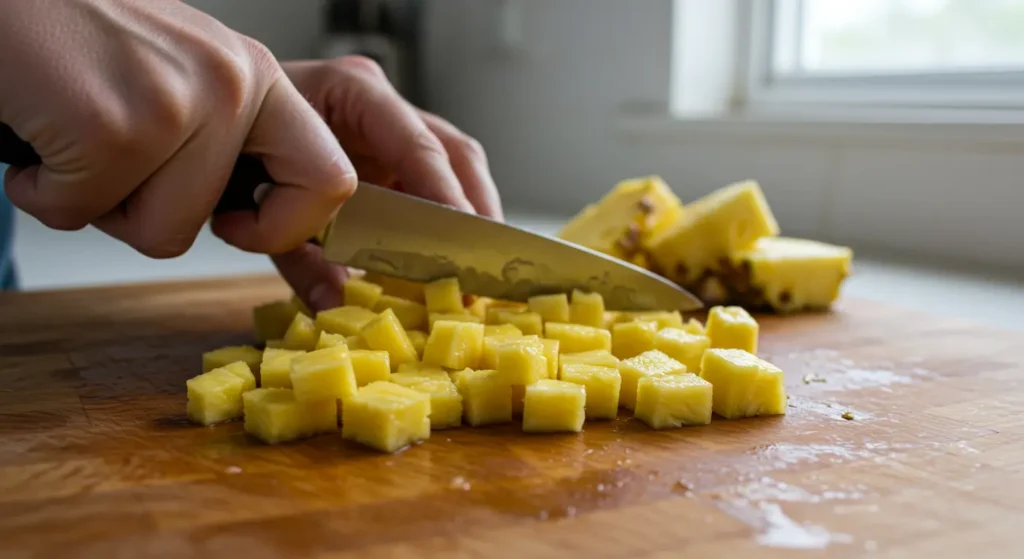
Signs of Overfeeding or Digestive Discomfort
After offering pineapple, keep an eye on your bearded dragon for any signs of digestive distress. Symptoms like loose or watery stools, lethargy, and reduced appetite can indicate that your pet has had too much or that the fruit isn’t agreeing with their system.
If you notice any of these signs, stop feeding pineapple immediately and return to their usual diet of leafy greens and insects. Providing plenty of fresh water can also help soothe their digestive tract. Observing your dragon’s behavior closely after treats will help you maintain a healthy balance and avoid discomfort.
Better Fruit Alternatives and Balanced Diet Tips
Not all fruits are created equal—and some are way better for your beardie than pineapple.
Fruits Bearded Dragons Can Safely Enjoy
Not all fruits are created equal when it comes to bearded dragons. While pineapple can be enjoyed occasionally, some fruits are much gentler and safer for your pet’s digestive system.
Fruits like blueberries, mango (in moderation), papaya, peeled apples, and strawberries make great treat options. These fruits offer beneficial vitamins and hydration without overwhelming your dragon with excessive sugar or acidity. Remember, even these fruits should be treated as occasional snacks rather than staples.
For a complete list of safe fruits and which ones to avoid, check out this helpful guide on beardie diets. Balancing fruit treats with leafy greens and insects ensures your pet gets the nutrients they need without risking digestive problems.
Which Fruits to Avoid Due to High Sugar or Acid
Certain fruits are best avoided entirely because they contain too much sugar or acid, which can harm your bearded dragon’s health.
Avoid citrus fruits like oranges and lemons, as their acidity can irritate the digestive tract. Grapes and cherries are high in sugar, while bananas are sticky and sugary, making them a poor choice. Watermelon might seem safe due to its high water content, but it offers little nutrition and too much sugar.
And remember, pineapple juice is also on the no-go list because it concentrates sugars and acids, which are tough on your dragon’s system.
Keeping these fruits out of your beardie’s diet helps maintain a balanced and healthy digestive system.
How to Balance Fruits with Greens and Insects
Fruits should make up less than 10% of your bearded dragon’s diet. The bulk of their nutrition should come from calcium-rich leafy greens such as collard, mustard, or dandelion greens. These provide essential vitamins and minerals needed for strong bones.
Protein is equally important and should come from insects like dubia roaches, crickets, or worms. Dusting these feeders with calcium powder several times a week helps support bone health.
Treats like pineapple should only be an occasional bonus, not a main feature. Maintaining this balance between greens, protein, and treats keeps your dragon thriving.
For a full breakdown of safe insects and feeding schedules, refer to this expert guide on insects for bearded dragons.
Final Thoughts: Is Pineapple Really Worth It for Bearded Dragons?
So, can bearded dragons have pineapple? The answer is yes—but only occasionally, and always fresh. Avoid pineapple juice entirely, as it’s too sugary and acidic for their delicate systems.
Think of pineapple as a sweet little treat rather than a main part of their diet. It’s like giving your dragon a tiny lollipop—fun and enjoyable in small doses, but not something they should have regularly.
When offered correctly—small pieces spaced out over time—pineapple adds a tasty tropical flavor without putting your pet’s health at risk. The key is moderation and balance.
Keep the majority of your bearded dragon’s diet filled with calcium-rich greens, protein-packed insects, and appropriate supplements. This solid foundation ensures they grow strong and stay healthy.
So, slice pineapple into tiny bites, limit how often you feed it, and focus on providing a well-rounded diet. Doing this means your beardie can safely enjoy a flavorful treat and live their best life.

